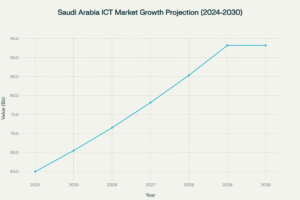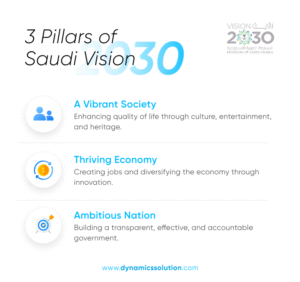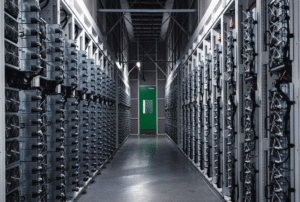
The Future of Technology Companies in Saudi Arabia: A Digital Renaissance in the Middle East
Saudi Arabia stands at the precipice of a technological revolution that promises to reshape not only the Kingdom’s economic landscape but also establish it as a global leader in innovation and digital transformation. The future of technology companies in Saudi Arabia is inextricably linked to the ambitious Vision 2030 initiative, creating unprecedented opportunities for growth, investment, and technological advancement across multiple sectors.
The Kingdom has demonstrated remarkable progress in building a robust technology ecosystem, with the ICT market projected to reach $93.21 billion by 2030, growing at an impressive CAGR of 9.22% from its current value of $59.97 billion in 2024. This growth trajectory reflects the government’s strategic commitment to economic diversification and digital transformation, positioning Saudi Arabia as a formidable player in the global technology arena.
Vision 2030: The Foundation of Technological Transformation
Saudi Arabia’s Vision 2030 serves as the cornerstone for the Kingdom’s technological future, representing a comprehensive blueprint for economic diversification beyond oil dependency. The initiative aims to increase the technology sector’s contribution to GDP from 1% to 5% by 2030, while fostering innovation across critical sectors, including artificial intelligence, cloud computing, fintech, and cybersecurity.

The transformation is already yielding tangible results, with the non-oil economy now accounting for 52% of GDP, demonstrating the success of diversification efforts. The digital economy has reached 495 billion SAR, contributing 15% to the GDP by 2024, while the Kingdom has achieved an 85.04% rating on the Digital Experience Maturity Index at an “advanced” level.
Artificial Intelligence and Project Transcendence
The future of technology companies in Saudi Arabia is being fundamentally shaped by Project Transcendence, a $100 billion AI initiative that positions the Kingdom at the forefront of artificial intelligence innovation. This massive investment represents one of the world’s largest national AI programs, focusing on developing hyperscale data centers powered by renewable energy, attracting global technology partnerships, and creating a comprehensive AI ecosystem.
Strategic partnerships with global technology giants are central to this initiative, with Google pledging $5-10 billion for AI projects, while negotiations continue with Microsoft, Oracle, and Huawei to enhance the Kingdom’s AI capabilities. The goal is ambitious yet achievable: to make Saudi Arabia one of the top 15 AI nations by 2030, with the capacity to export AI solutions globally.
The impact extends beyond mere investment figures. The Saudi Data and Artificial Intelligence Authority (SDAIA) is actively working to train 20,000 AI specialists, while the Kingdom’s AI model “ALLaM” has already achieved first place globally in its category. This demonstrates that Saudi Arabia is not merely following technological trends but actively leading them.
NEOM: The City of the Future
NEOM represents perhaps the most ambitious technological undertaking in modern history, a $500 billion megacity project that embodies the future of urban living through advanced technology integration. This futuristic development spans 26,500 square kilometers and includes multiple regions: THE LINE, Oxagon, Trojena, and Sindalah, each designed to showcase cutting-edge technological solutions.

The project leverages artificial intelligence, renewable energy, and smart city technologies to create a zero-carbon, circular economy that serves as a testbed for innovative urban solutions. NEOM’s partnership with Datavolt to create a massive artificial intelligence factory, with an initial $5 billion investment, is operational by 2028, exemplifying the scale and ambition of technological integration within the project.
Despite challenges and recent strategic reviews of certain components like THE LINE, NEOM continues to represent the Kingdom’s commitment to technological innovation and sustainable development. The project serves as a proving ground for technologies that will define the future of urban living globally.
Fintech Revolution and Digital Economy
Saudi Arabia’s fintech sector exemplifies the rapid growth potential for technology companies in the Kingdom. The sector is projected to reach $5.28 billion by 2030, growing at a CAGR of 13.08%. The number of active fintech companies has surged from just 10 in 2018 to over 261 by 2024, surpassing the 2025 target of 230 companies a full year ahead of schedule.

The transformation toward a cashless society is accelerating, with 75% of transactions now digital and non-cash retail transactions reaching 79% in 2024. This shift is supported by the Saudi Central Bank’s Open Banking Framework, launched in 2022, which creates opportunities for innovative financial products and services.
Must Read: DevOps vs. Traditional IT: Is DevOps Taking Over?
The sector has already produced three unicorn companies – Tabby, STC Pay, and Tamara – all demonstrating the potential for Saudi fintech companies to achieve global scale. The significant financing gap for SMEs and corporates, estimated at $80 billion, presents substantial opportunities for fintech companies to develop innovative lending and financing solutions.
Cloud Computing and Digital Infrastructure
The cloud computing market in Saudi Arabia represents another area of exceptional growth, with projections reaching $38.23 billion by 2033, growing at a CAGR of 11.33%. This expansion is driven by Vision 2030’s digital transformation mandate, the development of smart cities like NEOM, and increasing enterprise adoption of cloud services.
Major international cloud providers are establishing significant presences in the Kingdom, with Oracle investing $1.5 billion to expand cloud infrastructure, while Amazon, Microsoft, and Google are establishing major facilities. The government’s “Cloud First” policy and the establishment of a Cloud Computing Special Economic Zone demonstrate the strategic importance of this sector.
Cybersecurity: Protecting the Digital Future
Saudi Arabia’s cybersecurity sector is experiencing remarkable growth, valued at approximately $13.3 billion in 2023 and projected to reach $13.4 billion by 2029, with a CAGR between 11-13%. The Kingdom’s recent achievement of the highest ranking in the UN Global Cybersecurity Index demonstrates its commitment to building a robust digital security infrastructure.
The sector contributes 0.39% to GDP and has attracted significant investment, with the Kingdom investing $13.3 billion in cybersecurity products and solutions in 2023, marking a 10.83% increase from the previous year. This growth is driven by the digitization of public services, the expansion of 5G technology, and the integration of AI and IoT across various industries.
Startup Ecosystem and Innovation Hubs
Saudi Arabia has emerged as the fastest-growing startup ecosystem globally in 2025, with over 200% growth rate according to the Global Startup Ecosystem Index. The Kingdom now hosts over 2,000 active tech startups out of more than 10,000 startups across all sectors, with around 1,000 having received funding totaling over $138 billion.
Riyadh has risen to become the 3rd-ranked startup hub in the Middle East and 2nd in the Arab League, narrowing the gap with Dubai significantly. The city ranks highly in specific sectors: 14th globally in Transportation, 23rd in Foodtech, and 28th in both Edtech and Marketing.
Venture capital funding has been growing at nearly 49% per year since 2020, with startups raising $750 million in 2024 alone through 178 deals – the highest in MENA. This growth is supported by government-backed funds such as SVC, Jada, and the Public Investment Fund, creating a comprehensive funding ecosystem for entrepreneurs.
Challenges and Future Outlook
While the future appears bright, technology companies in Saudi Arabia face several challenges. These include the need for skilled technical talent, regulatory complexities, and the requirement for cultural adaptation and Sharia-compliant solutions. The acute talent deficit in cybersecurity and other technical fields requires continued investment in education and international recruitment.
However, the Kingdom’s proactive approach to addressing these challenges through strategic partnerships, educational initiatives, and regulatory frameworks positions it well for continued growth. The establishment of institutions like the National Cybersecurity Authority, the Digital Government Authority, and various accelerators and incubators demonstrates the comprehensive support structure being built for technology companies.
Conclusion: A New Era of Technological Leadership
The future of technology companies in Saudi Arabia is characterized by unprecedented opportunity, substantial government support, and strategic positioning for global leadership. With massive investments in AI, cloud computing, fintech, and cybersecurity, combined with ambitious projects like NEOM and comprehensive strategies like Vision 2030, the Kingdom is creating an environment where technology companies can thrive and scale globally.

As Saudi Arabia continues its transformation from an oil-dependent economy to a knowledge-based, innovation-driven society, technology companies will play an increasingly central role in shaping the Kingdom’s future. The combination of substantial financial resources, strategic vision, and commitment to technological advancement positions Saudi Arabia as one of the most promising markets for technology innovation and investment in the coming decades.
The Kingdom’s journey toward becoming a global technology hub is not just about economic diversification – it represents a fundamental reimagining of what a modern, technologically advanced society can achieve. For technology companies, Saudi Arabia offers not just a market, but a partner in building the digital future of the Middle East and beyond.





